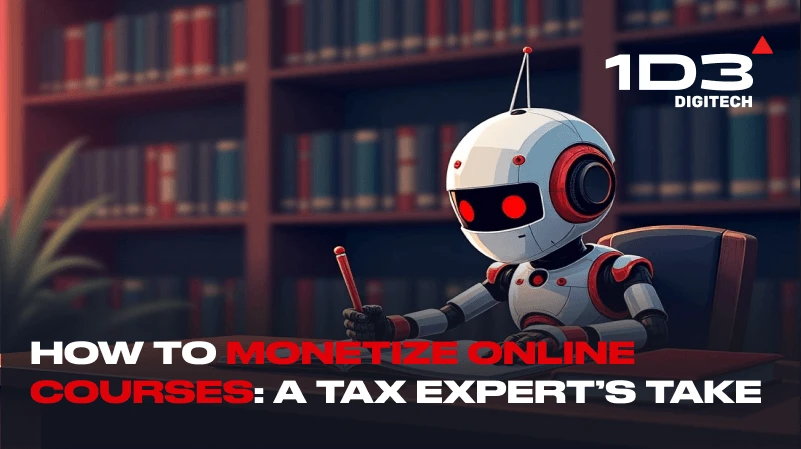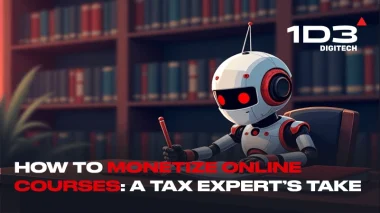Ever think about how to monetize online courses while also sharing your expertise with a worldwide audience? You’re not alone. The moment you put a price tag on your knowledge (especially for customers overseas), you enter a tangled web of VAT, sales tax, and compliance regulations.
Below, we’ll break down how to monetize online courses in a way that keeps taxes in check, highlighting essential rules in both the EU and the U.S. And if you’re worried about doing it all on your own, don’t fret. A Merchant of Record might save the day.
Online Courses in the Big Picture
Everyone loves learning on their own schedule, which explains why online courses have surged in popularity. Got a knack for digital marketing? Mastery in calligraphy? A gift for teaching advanced science topics? There’s likely an eager audience out there waiting to pay for your lessons.
However, because these courses are often considered digital services under various jurisdictions, you may face tax obligations the moment you charge for them. Let’s explore how this applies to two key regions: Europe and the United States.
START MONETIZING YOUR ONLINE COURSE NOW!
GET IN TOUCH WITH 1D3The EU’s Take on VAT
The European Union is famous for its Value-Added Tax (VAT) system, and online courses typically count as digital services if they’re largely automated. VAT rates in EU member states hover around 17% to 27%, depending on the country.
Here’s a quick rundown:
- Place of Consumption Principle
EU law generally taxes digital services based on the customer’s location. So if you sell a course to a German buyer, you’d apply Germany’s VAT rate. - Automated vs. Human Involvement
Courses that rely heavily on pre-recorded videos, downloadable PDFs, and do not involve live interaction are usually treated as digital services. If you include live, interactive webinars, VAT treatment could change. - OSS (One-Stop Shop)
Selling to learners in multiple EU countries? You can simplify your VAT reporting by registering for the One-Stop Shop system, centralizing all VAT returns. - Potential VAT Exemptions
Accredited educational programs qualify for VAT exemptions. Though it’s relatively rare to gain that official stamp. If you think your course meets the criteria for accreditation, it’s well worth checking whether you can claim these exemptions. - B2B vs. B2C
Selling directly to consumers (B2C)? You typically need to collect and remit VAT. The "reverse charge" mechanism may apply if the buyer is a VAT-registered business in another EU country.
Consequences of Not Paying EU VAT
Neglecting to pay EU VAT can lead to steep fines and penalties that quickly add up. Overdue taxes often come with interest, adding further pressure. You could even face legal trouble if authorities see it as willful evasion. When things escalate, your reputation may suffer, and your ability to operate in certain EU markets could be cut off entirely. That risk alone can derail expansion plans, drain resources, and create lasting stress.
Sales Tax in the United States
Unlike the EU’s unified approach, the U.S. splits tax obligations across individual states. Rates can hover between 0% and 10% (and sometimes higher with local sales taxes), and the specifics for digital products vary dramatically.
Here’s what to watch out for:
- Digital Products vs. Services
Some states view online courses as taxable digital goods, while others regard them as services that might be exempt. - Format Matters
If your course is purely digital (videos or downloads), states like Texas or New York often tax it. Meanwhile, places like California or Florida might exempt it unless you provide physical materials. - Educational vs. Entertainment
Certain states may waive sales tax if your course is tied to formal education or professional development. Hobby-oriented courses, however, are more likely to be taxed. - Physical Materials
Hand out a printed workbook or USB flash drive? That portion usually counts as tangible property and can be taxed. - Presence vs. Economic Nexus
High sales in a state (for example, over $100,000 or 200 transactions) can trigger economic nexus, obligating you to collect sales tax even if you lack a physical location. - B2C vs. B2B
Direct consumer (B2C) sales are typically taxed if that state taxes digital goods. But if you’re selling to accredited educational institutions (B2B), you might avoid charges. - Subscriptions and Licensing
Subscriptions can be viewed as services in some states and taxed as digital products in others. Check each state’s rules in detail.
Consequences of Not Paying U.S. Sales Tax
Skipping required sales tax can spark an audit, followed by hefty back taxes, interest, and steep penalties. If things escalate, you might face frozen funds or restricted operations, potentially derailing your plans and draining your budget. Even smaller businesses aren’t immune: state authorities don’t hesitate to chase unpaid taxes when they detect a pattern of non-compliance. It’s a serious threat that can upend your growth, hurt your reputation, and leave you with headaches no one wants to deal with.
How to Monetize Online Courses Effectively
Now that you know a bit more about taxes, let's shift our focus to how you can distribute your content and monetize your courses. The method you choose, whether using established platforms or hosting your own site, can make a significant difference in your earnings. We will explore various revenue models, from subscriptions to one-time purchases, to help you maximize your profits and reach a broader audience.
Platforms vs. Self-Hosting
Choosing where to host your courses is a big decision. Many course creators are initially drawn to popular platforms like Udemy or Teachable, because they handle so much for you — marketing, tech support, and even attracting a ready audience. However, these platforms can charge hefty commissions, sometimes as high as 30 percent, which can really squeeze your margins.
In contrast, hosting your courses on your own website gives you full control over your branding and pricing. The trade-off? You’ll need to manage your own payment processing, marketing, and customer support. Ultimately, the choice is yours: are you willing to sacrifice part of your profits for ease, or do you prefer investing extra time upfront to keep more revenue in your pocket?
How to Monetize Online Courses: Revenue Models
With your hosting options clear, let’s move on to the heart of the matter: practical ways to monetize your online courses. Whether you’re just starting out or looking to expand, consider these popular revenue models:
- Subscription Models
Charge a recurring fee (monthly or yearly) to access a library of courses. Ideal for those with ongoing or evolving content. - One-Time Purchases
Keep it simple. Learners pay once for permanent (or time-limited) access. It’s a clear approach that works well for evergreen content. - Freemium Teasers
Offer initial lessons at no cost, then charge for deeper modules or premium features. This helps establish trust before buyers commit. - Corporate Licensing
If your material benefits companies, bundle it for employers seeking training options for entire teams. Fewer transactions and bigger revenue. - Affiliate Partnerships
Partner with influencers or bloggers who recommend your course. You share a commission on each sale but reach a wider audience.
Enter the Merchant of Record (and Monetize With Less Stress)
Managing VAT, sales tax, and payment gateways can be complex. Partnering with a Merchant of Record (MoR) service can be an ideal solution for an online course business, acting as your global distributor so you don't have to worry about local taxes, payment methods, or currency issues. Here is how a Merchant of Record can assist your business:
- Tax Compliance: The MoR accurately calculates and remits VAT or sales tax for each region, freeing you from the challenge of managing diverse tax regulations.
- Payment Processing: They handle currency conversions, local payment methods, and fraud prevention, ensuring a seamless checkout experience in multiple currencies.
- Market Access: By managing regional requirements and adapting to local payment preferences, the MoR broadens your market reach and facilitates global operations.
- Customer Support: Dedicated support teams are available to resolve issues promptly, ensuring a smooth experience for both you and your customers.
- Cost Efficiency: Unlike many popular platforms that take hefty commissions, 1D3 Digitech typically charges only 3 percent, allowing you to retain a larger share of your revenue.
THE MOST COST-EFFECTIVE MERCHANT OF RECORD SERVICE
GET IN TOUCH WITH 1D3Wrap-Up: Final Tips on How to Monetize Online Courses
Let’s be honest, figuring out how to monetize online courses is about more than posting a simple “Buy Now” button. The instant someone makes a purchase, you could owe VAT or sales tax. Fortunately, by understanding the basics or partnering with a Merchant of Record, you’ll set yourself up for smooth growth minus the random tax surprises.
Offer valuable content and keep your tax obligations in check, and you’ll be on the right track. Now that you know how to monetize online courses, you can shift your energy toward delivering lessons that spark excitement, skill development, and a sense of accomplishment for learners across the globe. Happy teaching!





